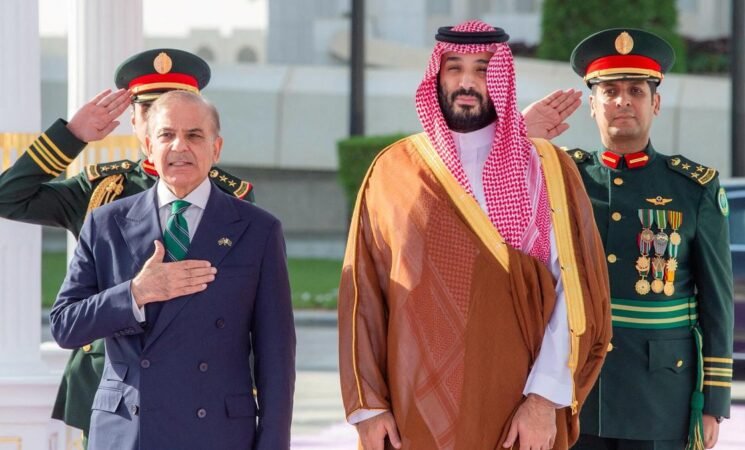2 October 2025, NIICE Commetary 11793
Ashish Keserwani
On 17 September 2025, Pakistan's Prime Minister, Shehbaz Sharif, and Saudi Arabia's Crown Prince and Prime Minister, Mohammed bin Salman, signed the Strategic Mutual Defence Agreement. According to the joint statement, this agreement states that any aggression against either country shall be considered an aggression against both. This agreement signifies that the custodian of Islam’s two holiest mosques, Saudi Arabia, and the only Islamic nuclear power, Pakistan, are aiming to elevate their relationship to a new height.
Historical Military Cooperation between Pakistan and Saudi Arabia
Pakistan, a militarily more powerful country, and Saudi Arabia, a financially more capable country, have always enjoyed a special relationship. Over the years, both of them have proved their willingness to come to each other’s aid. In 1979, Islamabad helped Riyadh by providing its special forces to free the Grand Mosque of Mecca from fundamentalist elements. However, it should be noted that some experts reject the fact that Pakistani soldiers were involved and claim that there is no official document available supporting it. Pakistan has also played a critical role in Saudi Arabia’s defence by providing military training, advisory and security roles. According to some sources, since 1967, Pakistan has trained more than 8200 Saudi Arabian armed personnel. On several occasions, Pakistan forces were also stationed in Saudi Arabia. During the 1970s and 1980s, nearly 15000 Pakistani soldiers were deployed in the kingdom. Most of them were recalled after the end of the Iran-Iraq war in 1988. But some contingents stayed on. In 2015, then Prime Minister of Pakistan, Nawaz Sharif, visited Riyadh and reiterated the commitment to protect the kingdom’s territorial integrity. In 2018, under their bilateral security cooperation, Pakistan sent an army contingent to the Kingdom for training and advice to the Kingdom’s armed forces. In return, a financially capable Saudi Arabia granted Pakistan direct financial aid and supplied it with oil at very favourable terms.
Implications for India
If we consider the term ‘aggression’ in the agreement as it refers to military aggression. Though it can also refer to cyber and terror threats. The possible countries that can pose a military threat to Saudi Arabia and Pakistan are Israel and India, respectively. In case of a military confrontation between Israel and Saudi Arabia, openly declaring Israel a hostile nation will not be problematic for Pakistan. But the same can not be said about India, in the case of the India-Pakistan military confrontation.
In South Asia, a conflict-like situation between India and Pakistan is not surprising. In that case, according to the agreement, Riyadh should take a stand against India in favour of Pakistan. Is Riyadh open to taking that option? To find the answer, let’s dive into the basics. India-Saudi relations are in an upward direction. The economic partnership is strong, and trade is increasing. Political relations are also friendly, and no major fault line is present. They share a strategic partnership. Recently, in the 7th meeting of the India-Saudi Arabia Joint Committee on Defence Cooperation, India offered to provide training to Saudi armed personnel, which Pakistan has been doing for many decades. Therefore, the chances of Riyadh taking any strong action against India seem unlikely.
Let’s take the recent India-Pakistan military confrontation as an example. The day when a terrorist attack was carried out in Pahalgam, Jammu and Kashmir, the Prime Minister Modi was in Saudi Arabia. Saudi Arabia's Crown Prince and Prime Minister, Mohammed bin Salman, condemned this incident. In the official statement, the Kingdom strongly expressed its opposition to all forms of violence and extremism. Thereafter, when the military confrontation started between India and Pakistan, Saudi Arabia made diplomatic efforts to de-escalate the tension.
It seems India is not a target of this agreement. However, it cannot be ruled out that in the case of any future military confrontation between India and Pakistan, Riyadh will be pressurised by Islamabad to show Islamic solidarity and take a strong stand against India.
Indian Stance
The Strategic Mutual Defence Agreement signed by Saudi Arabia and Pakistan on 17 September was not a surprise for India. On 18 September, the official spokesperson of the Ministry of External Affairs, Randhir Jaiswal, said New Delhi was aware of the developments. He further said the government will study the implications of this development for national security and regional and global stability. The next day, while responding to queries, Jaiswal said that New Delhi is expecting Saudi Arabia to keep in mind the mutual interests and sensitivities.
Conclusion
Pakistan and Saudi Arabia share a close, friendly, and special relationship. They have strong military ties. Due to its Islamic brotherhood and presence of holy sites of Islam, Pakistan commits to securing the territorial integrity of Saudi Arabia. To further improve their bilateral cooperation, they have signed the Strategic Mutual Defence Cooperation Agreement. Because of the unfriendly relationship between India and Pakistan, this impacts India. Pakistan aims to complicate India’s strategic calculations. However, it presents a complex situation for India. A direct, strong action, including military action from Saudi Arabia against India, is highly improbable. But indirect consequences cannot be ruled out.
Ashish Keserwani is a PhD Research Scholar at Amity University Uttar Pradesh, Noida, India.

